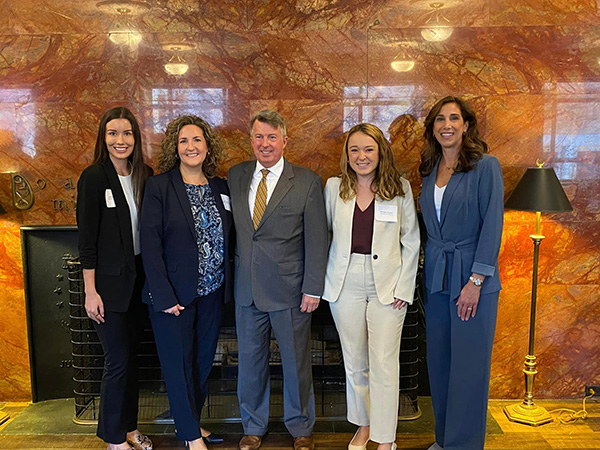
Students Make Impact Through Pro Bono Guardianship Monitoring Program
Four law students from Widener University Commonwealth Law School are making a difference in their community through the Honorable Todd A. Hoover Pro Bono Guardianship Monitoring Program. Established in 2007, the program addresses the growing need for court oversight in guardianship cases within Dauphin County, where more than 500 active cases are currently managed.
Guardianships are legal arrangements where a court appoints a guardian to manage the personal and financial affairs of an incapacitated individual, often an older adult unable to make decisions due to age, illness, or disability. A guardian—typically a family member or professional—makes crucial decisions to protect the individual's finances, safety, and health. While guardianships are sometimes necessary, they are increasingly seen as a last resort, with alternatives like powers of attorney or financial representatives preferred when possible. These alternatives allow older adults to retain autonomy over their decisions.
“When people don’t plan for potential incapacitation, guardianship can become the default remedy,” explained Mary Catherine Scott, associate clinical professor of law and director of the Central Pennsylvania Law Clinic. “Our program seeks to safeguard vulnerable individuals in these cases, helping ensure guardianship is only applied when absolutely necessary.”
Widener’s partnership with the Guardianship Monitoring Program, established two years ago, provides crucial support to Dauphin County’s courts. Law students—Helene Hess, Brittany Ewing, Morgan Engler, and Vanessa Peck—serve as monitors, assessing the well-being of people under guardianship, often known as wards, and reporting back to the court. Acting as the court’s “eyes and ears,” these students work closely with guardians and care providers to ensure wards receive appropriate care and respect.
“Our students play a critical role in overseeing guardianships, often leading to impactful outcomes,” Scott said. She recounted a recent case where student involvement led to the termination of a client’s guardianship. “Our client had recovered enough from a stroke to participate in her own decision-making, allowing us to advocate for her autonomy and establish less restrictive safeguards. This result demonstrates the meaningful change our students can drive.”
Hess, introduced to the program as a certified legal intern, reflected on the impact of her work. “I’ve developed a strong interest in estate planning. Meeting with the ward and their guardian provides me with a hands-on understanding of guardianship cases and the unique needs of each individual.”
Ewing echoed the program’s importance, highlighting her role in maintaining regular communication with guardians to schedule meetings, review progress, and share updates. “Each case is unique, and it’s important to approach each situation with empathy and attentiveness,” she noted.
Scott emphasized the educational value of the program, stating, “Through their participation, students not only learn the legal complexities of guardianship law but also gain awareness of elder abuse, neglect, and exploitation—issues that sometimes arise in guardianship cases.”
With guardianship cases on the rise, the need for monitors like Hess and Ewing remains critical. Their dedication exemplifies the role of legal advocacy and community service, ensuring that the rights and well-being of vulnerable individuals are protected and prioritized within the judicial system.
